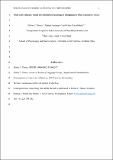Files in this item
Food calls enhance visual discrimination learning in chimpanzees (Pan troglodytes verus).
Item metadata
| dc.contributor.author | Déaux, Eloïse C. | |
| dc.contributor.author | Baumeyer, Adrian | |
| dc.contributor.author | Zuberbühler, Klaus | |
| dc.date.accessioned | 2021-09-29T16:30:15Z | |
| dc.date.available | 2021-09-29T16:30:15Z | |
| dc.date.issued | 2021-08-01 | |
| dc.identifier | 274286256 | |
| dc.identifier | 6be19ff3-5dbc-40ae-9308-2f66f5b81a23 | |
| dc.identifier | 85118931117 | |
| dc.identifier | 85118931117 | |
| dc.identifier | 000699927200018 | |
| dc.identifier.citation | Déaux , E C , Baumeyer , A & Zuberbühler , K 2021 , ' Food calls enhance visual discrimination learning in chimpanzees (Pan troglodytes verus). ' , Journal of Comparative Psychology , vol. 135 , no. 3 , pp. 420-429 . https://doi.org/10.1037/com0000286 | en |
| dc.identifier.issn | 0735-7036 | |
| dc.identifier.other | ORCID: /0000-0001-8378-088X/work/105594174 | |
| dc.identifier.uri | https://hdl.handle.net/10023/24059 | |
| dc.description | The study was funded by the National Swiss Foundation (grant number: SNF 31003A_166458). | en |
| dc.description.abstract | Social learning is of universal importance to animal life, and communication is likely to foster it. How do animals recognize when others produce actions that lead to relevant new information? To address this, we exposed 4 chimpanzees to an arbitrary learning task, a 2-choice visual discrimination paradigm presented on a touch screen that led to food reward. In each trial, images were paired with 1 of 4 acoustic treatments: (a) relevant or (b) irrelevant chimpanzee calls (“rough grunts” to food; “pant grunts” to a dominant conspecific), (c) a mechanical noise (hammer knocking sounds) and (d) silence. As we were interested in the effect of food calls on learning speed as compared to control stimuli, each chimpanzee was tested with the food call treatment, and 1 of the 3 control stimuli (either the pant grunt, mechanical noise, or silence condition). We found that learning was significantly enhanced in the contextually correct “rough grunt” condition, suggesting that food calls may play a role in the cultural transmission of food preferences, by priming individuals about a learning opportunity. We discuss these findings and propose that, at least in chimpanzees, the enhancing effect of these vocalizations may be related to the way they affect receivers’ motivational/emotional and/or attentional systems. (PsycInfo Database Record (c) 2021 APA, all rights reserved) | |
| dc.format.extent | 10 | |
| dc.format.extent | 520961 | |
| dc.language.iso | eng | |
| dc.relation.ispartof | Journal of Comparative Psychology | en |
| dc.subject | Social learning | en |
| dc.subject | Vocalisation | en |
| dc.subject | Touch screen | en |
| dc.subject | Emotion | en |
| dc.subject | Motivational processes | en |
| dc.subject | BF Psychology | en |
| dc.subject | Ecology, Evolution, Behavior and Systematics | en |
| dc.subject | Psychology (miscellaneous) | en |
| dc.subject | DAS | en |
| dc.subject.lcc | BF | en |
| dc.title | Food calls enhance visual discrimination learning in chimpanzees (Pan troglodytes verus). | en |
| dc.type | Journal article | en |
| dc.contributor.institution | University of St Andrews. Institute of Behavioural and Neural Sciences | en |
| dc.contributor.institution | University of St Andrews. Centre for Social Learning & Cognitive Evolution | en |
| dc.contributor.institution | University of St Andrews. School of Psychology and Neuroscience | en |
| dc.identifier.doi | 10.1037/com0000286 | |
| dc.description.status | Peer reviewed | en |
| dc.date.embargoedUntil | 2021-09-23 | |
| dc.identifier.url | https://psycnet.apa.org/doi/10.1037/com0000286.supp | en |
This item appears in the following Collection(s)
Items in the St Andrews Research Repository are protected by copyright, with all rights reserved, unless otherwise indicated.

